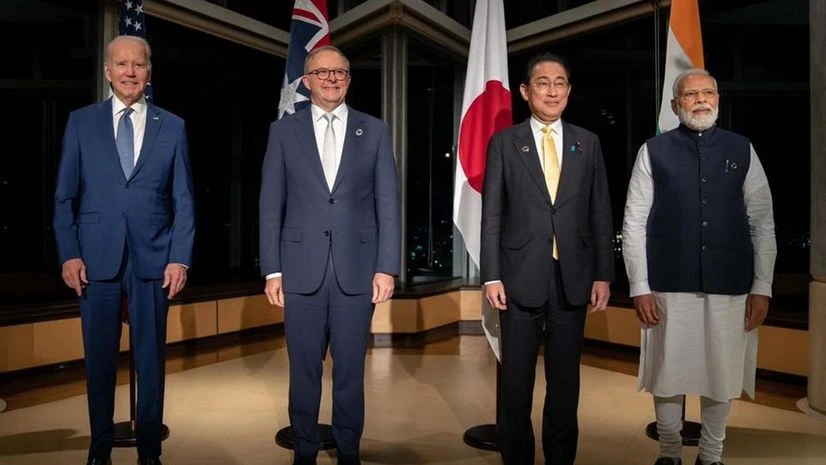US President Joe Biden is set to host the final Quad summit of his term in his hometown Wilmington, Delaware. The meeting, scheduled for September 21, will feature the leaders of Australia, India, and Japan, highlighting Biden’s personal emphasis on strengthening US alliances in his Indo-Pacific strategy.
The summit will mark Biden’s fourth in-person gathering with Prime Minister Anthony Albanese of Australia, Prime Minister Narendra Modi of India, and Prime Minister Fumio Kishida of Japan, reaffirming the importance of the Quadrilateral Security Dialogue (Quad) in countering China’s growing influence in the region.
Initially slated to be held in India, the summit was moved to the US to coincide with world leaders travelling to the United Nations General Assembly in New York City. Biden’s decision to host the event in Wilmington, instead of New York, reflects his personal approach to diplomacy, signalling a deep commitment to maintaining and strengthening US alliances.
Part of a broader Indo-Pacific strategy
Biden’s administration has emphasised the significance of the Quad since 2021, positioning it as a critical platform for addressing security challenges in the Indo-Pacific region. The White House views the Quad as a key response to China's increasing military and economic assertiveness, particularly in the South China Sea. Senior officials indicate that the summit will focus on solidifying cooperation in health, disaster relief, and maritime security — areas where the Quad has made significant inroads.
A senior administration official previewing the summit told CNN, “The Quad demonstrates that the region values collective action, which has allowed us to promote peace and stability, despite the challenges posed by China.”
Concrete deliverables from the summit are expected to include a significant initiative in global health and health security, humanitarian collaboration, and further efforts to strengthen the Indo-Pacific Partnership for Maritime Domain Awareness, an initiative aimed at countering China's aggressive activities in contested maritime regions.
More From This Section
Setting the stage for the future of the Quad
While the Quad summit comes weeks before the US presidential election, Biden and his counterparts aim to secure the Quad’s future beyond their respective terms. Officials are preparing to ensure that the alliance remains a bipartisan foreign policy priority in the United States. This includes long-term funding from national budgets and securing legislative support for Quad initiatives.
Despite Biden’s impending departure from office in January, the Quad is expected to endure. The official said, “While the Quad is a cornerstone of President Biden’s Indo-Pacific legacy, it is becoming an institution that will continue to shape the region’s geopolitical landscape.”
The upcoming summit will also serve as a farewell for Japanese Prime Minister Fumio Kishida, who is stepping down after opting not to seek re-election. Kishida’s successor, however, is expected to maintain Japan’s full commitment to the Quad.
Biden’s legacy: Strengthening alliances in a critical time
Biden’s approach to the Quad has been deeply personal, shaped by his long-standing belief in fostering close relationships with foreign leaders. As he shifts his focus towards foreign policy in his final months in office, Biden is expected to continue his engagement with international counterparts, with planned travel to the G20 Summit in Brazil and the Asia-Pacific Economic Cooperation meeting in Peru in November.
His administration is also eyeing potential trips to Germany and Africa, alongside ongoing dialogue with Chinese President Xi Jinping. Tensions with China, particularly concerning US alliances in the Indo-Pacific, remain a central issue as Biden looks to cement his legacy in global diplomacy.
Historical significance and global attention
The upcoming Delaware summit will be the first time Biden hosts world leaders in his hometown since taking office. It follows his hosting of Japanese Prime Minister Kishida and South Korean President Yoon Suk Yeol at Camp David last year, a meeting widely seen as strengthening trilateral cooperation in the region.
Biden’s decision to host the Quad summit in Wilmington also mirrors historical precedents of US presidents hosting foreign leaders in personal settings, such as George W Bush’s talks with Russian President Vladimir Putin at his Texas ranch in 2001, and Barack Obama’s hosting of the Nato summit in his home city of Chicago in 2012.
Quad’s role in the Indo-Pacific
Known as the Quadrilateral Security Dialogue, the ‘Quad’ was formed after the 2004 Indian Ocean tsunami to coordinate disaster relief efforts. The partnership, championed by then-Japanese Prime Minister Shinzo Abe, became dormant for several years due to concerns over China’s reaction. It was revived in 2017 as attitudes towards China’s rising power shifted across the region.
Though China has labelled the Quad as an ‘Asian Nato’, there is no mutual defence agreement in place among the four countries. Instead, the Quad seeks to deepen economic, diplomatic, and military cooperation. The group’s shared vision for a “free, open, and inclusive Indo-Pacific” is a direct challenge to China’s regional ambitions.
What to expect from the summit
While the focus of the September 21 summit will be on strengthening existing partnerships, the leaders will also aim to deliver tangible outcomes across multiple sectors. Health and security initiatives are expected to feature prominently, alongside plans to counter China’s assertiveness in the Indo-Pacific.
As the US prepares for a pivotal election in November, world leaders will be watching closely to see whether Biden’s efforts to reinforce alliances in the region will carry over into the next administration, regardless of whether Vice President Kamala Harris or former President Donald Trump takes the helm in 2025.
With Kishida stepping down and Biden potentially in his final weeks as president, this Quad summit could represent a defining moment not only for the Indo-Pacific region but for the global order at large.

)
